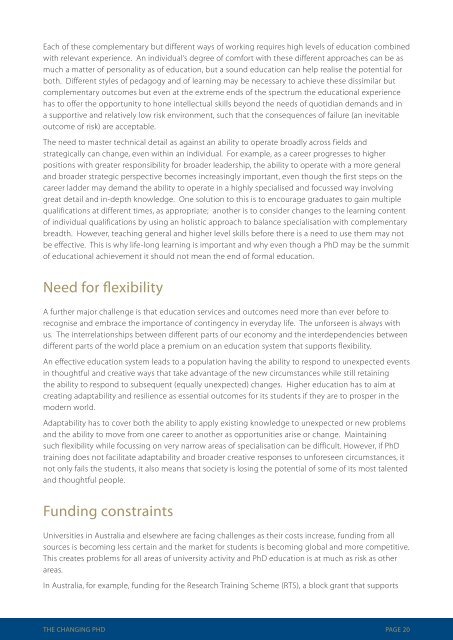the-changing-phd_final
the-changing-phd_final
the-changing-phd_final
You also want an ePaper? Increase the reach of your titles
YUMPU automatically turns print PDFs into web optimized ePapers that Google loves.
Each of <strong>the</strong>se complementary but different ways of working requires high levels of education combined<br />
with relevant experience. An individual’s degree of comfort with <strong>the</strong>se different approaches can be as<br />
much a matter of personality as of education, but a sound education can help realise <strong>the</strong> potential for<br />
both. Different styles of pedagogy and of learning may be necessary to achieve <strong>the</strong>se dissimilar but<br />
complementary outcomes but even at <strong>the</strong> extreme ends of <strong>the</strong> spectrum <strong>the</strong> educational experience<br />
has to offer <strong>the</strong> opportunity to hone intellectual skills beyond <strong>the</strong> needs of quotidian demands and in<br />
a supportive and relatively low risk environment, such that <strong>the</strong> consequences of failure (an inevitable<br />
outcome of risk) are acceptable.<br />
The need to master technical detail as against an ability to operate broadly across fields and<br />
strategically can change, even within an individual. For example, as a career progresses to higher<br />
positions with greater responsibility for broader leadership, <strong>the</strong> ability to operate with a more general<br />
and broader strategic perspective becomes increasingly important, even though <strong>the</strong> first steps on <strong>the</strong><br />
career ladder may demand <strong>the</strong> ability to operate in a highly specialised and focussed way involving<br />
great detail and in-depth knowledge. One solution to this is to encourage graduates to gain multiple<br />
qualifications at different times, as appropriate; ano<strong>the</strong>r is to consider changes to <strong>the</strong> learning content<br />
of individual qualifications by using an holistic approach to balance specialisation with complementary<br />
breadth. However, teaching general and higher level skills before <strong>the</strong>re is a need to use <strong>the</strong>m may not<br />
be effective. This is why life-long learning is important and why even though a PhD may be <strong>the</strong> summit<br />
of educational achievement it should not mean <strong>the</strong> end of formal education.<br />
Need for flexibility<br />
A fur<strong>the</strong>r major challenge is that education services and outcomes need more than ever before to<br />
recognise and embrace <strong>the</strong> importance of contingency in everyday life. The unforseen is always with<br />
us. The interrelationships between different parts of our economy and <strong>the</strong> interdependencies between<br />
different parts of <strong>the</strong> world place a premium on an education system that supports flexibility.<br />
An effective education system leads to a population having <strong>the</strong> ability to respond to unexpected events<br />
in thoughtful and creative ways that take advantage of <strong>the</strong> new circumstances while still retaining<br />
<strong>the</strong> ability to respond to subsequent (equally unexpected) changes. Higher education has to aim at<br />
creating adaptability and resilience as essential outcomes for its students if <strong>the</strong>y are to prosper in <strong>the</strong><br />
modern world.<br />
Adaptability has to cover both <strong>the</strong> ability to apply existing knowledge to unexpected or new problems<br />
and <strong>the</strong> ability to move from one career to ano<strong>the</strong>r as opportunities arise or change. Maintaining<br />
such flexibility while focussing on very narrow areas of specialisation can be difficult. However, if PhD<br />
training does not facilitate adaptability and broader creative responses to unforeseen circumstances, it<br />
not only fails <strong>the</strong> students, it also means that society is losing <strong>the</strong> potential of some of its most talented<br />
and thoughtful people.<br />
Funding constraints<br />
Universities in Australia and elsewhere are facing challenges as <strong>the</strong>ir costs increase, funding from all<br />
sources is becoming less certain and <strong>the</strong> market for students is becoming global and more competitive.<br />
This creates problems for all areas of university activity and PhD education is at much as risk as o<strong>the</strong>r<br />
areas.<br />
In Australia, for example, funding for <strong>the</strong> Research Training Scheme (RTS), a block grant that supports<br />
THE CHANGING PHD PAGE 20


